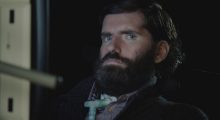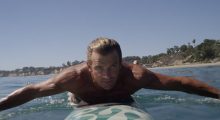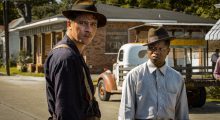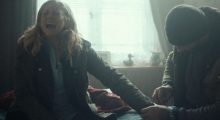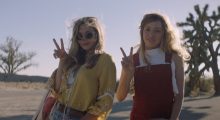Sundance
-
“An Uplifting and Life-Affirming Experience”: Director Frankie Fenton | It’s Not Yet Dark

During its development, production or eventual distribution, what specific challenge of communication did, or will your film, face? How did you deal with it, or how are you planning to deal with it? This question is, to say the least, spookily resonant with It’s Not Yet Dark. Our documentary is about a man who has lost the ability to speak. Much like every other part of his body except for his eyes, Simon Fitzmaurice, an Irish director, is unable to move. He suffers from Motor Neuron Disease or A.L.S. as it’s called in the US and communicates using a computer […]
-
“Accessing Their Intimacy with Respect”: Editor Sofia Subercaseaux on Dina

Four years ago, Sofia Subercaseaux was using YouTube tutorials to teach herself how to edit a feature film. She has since gone on to edit Nasty Baby, Christine and now Dina, the new documentary from Mala Mala directors Dan Sickles and Antonio Santini. Dina documents the lives of Dina and Scott, a couple very much in love but with profound complications when it comes to physical intimacy. Before the film’s debut at Sundance 2017, Subercaseaux spoke with Filmmaker about how she broke into editing, working with two directors and the task of shaping hours of documentary footage into a final narrative. Filmmaker: How and […]
-
Editor Azin Samari on Sundance Surfing Documentary Take Every Wave: The Life of Laird Hamilton

Editor Azin Samari has cut everything from reality TV shows like The Bachelorette and The Hills to award-winning documentaries such as The September Issue. For her latest feature, Samari edited Take Every Wave: The Life of Laird Hamilton, a documentary on the celebrity surfer from director Rory Kennedy (Last Days in Vietnam). We spoke with Samari before the film’s premiere at the 2017 Sundance Film Festival. Below, Samari speaks about her previous work with Kennedy, her love of Thelma Schoonmaker and cracking the veneer of a media-savvy figure like Hamilton. Filmmaker: How and why did you wind up being the editor of your […]
-
Sundance: The Narrative Radicalism of Dee Rees’ Mudbound

I implore you to go into Dee Rees’ wonderful Mudbound with an open mind. Here’s a warning to help you do so: this film is more narratively radical than you might imagine. It starts quietly. It’s patient, a true slow burn. It’s well-aware of this fact, even proud of it. At times you might perceive the film to be unfocused or fractured. You might be put off by some of the narrative techniques on display — for instance, the film’s heavy reliance on expositional voice-over. Or its overabundance of subplots (many of which remain unrelated to the central story). Or the fact that […]
-
“Our Intent Was Never to Make Viewers Laugh”: Directors Jonathan Milott and Cary Murnion | Bushwick

During its development, production or eventual distribution, what specific challenge of communication did, or will your film, face? How did you deal with it, or how are you planning to deal with it? One challenge of communication we originally faced was when we started pitching the idea over seven years ago. We presented the idea of Texas seceding from the U.S. and starting a civil war. At the time it sounded like a ridiculous satire and some people thought we wanted to make a comedy. Our intent was never to make viewers laugh though. The seeds of political animosity have […]
-
“As Crazy and Unpredictable as Real Life”: Director Matt Spicer | Ingrid Goes West

During its development, production or eventual distribution, what specific challenge of communication did, or will your film, face? How did you deal with it, or how are you planning to deal with it? I think the biggest challenge of communicating nowadays is figuring out how to make your voice heard amidst all the noise. There is so much out there vying for people’s attention, and it’s easy to get lost in the shuffle. This applies to indie filmmakers as well. We don’t have massive marketing budgets to buy ad space or air time, and oftentimes we’re lucky to even find […]
-
“I Became Like Furniture”: Director/DP Jonathan Olshefski on Quest

Jonathan Olshefski spent a decade filming the Rainey family. He’d visit the family’s home often without a camera, simply to spend time with Quest, his wife and their children. As he notes in his interview with Filmmaker, this longterm commitment allowed him to “fade into the background and record natural scenes where the camera was not intrusive.” His documentary feature debut, Quest offers an intimate, vérité-like portrait of a black family in Philadelphia. Below, Olshefski speaks about the genesis of the project, his documentary influences and serving as his own DP. Quest made its world premiere at the 2017 Sundance Film Festival. Filmmaker: How and why did you […]
-
“Directing in Stereo”: Directors Alicia Scherson and Cristian Jimenez | Family Life

During its development, production or eventual distribution, what specific challenge of communication did, or will your film, face? How did you deal with it, or how are you planning to deal with it? Since we were two directors on set, which is unusual, we had to deal with the challenge of communicating with the crew and actors as one single voice. We created a method. There were days when one of us had the director’s cap and the second director had to refrain from talking to the cast or crew directly and had to go through the first director. A bit like […]
-
“Chronic Illness Doesn’t Lead to Tidy Endings”: Editor Kim Roberts on Unrest

Jennifer Brea had a challenge: to make a film from bed. Brea was a PhD student at Harvard when a sudden illness left her bedridden. She sought to create a documentary portrait of her experience and found support from labs at Sundance, IFP and elsewhere. She premiered Unrest, her debut film, in competition at the 2017 Sundance Film Festival. Kim Roberts, an editor and writer on the film, spoke with Filmmaker about what drew her to the project and finding the right tone for a story this personal. Filmmaker: How and why did you wind up being the editor of your film? What […]
-
“Editing Is an Unending Series of Difficult Decisions”: Editor Peter Kinoy on 500 YEARS

For director Pamela Yates and her colleagues at Skylight, 500 YEARS marks the end of a documentary trilogy on Guatemala. The film follows When the Mountains Tremble (1983) and Granito: How to Nail a Dictator (2011), both of which screened in previous years at the Sundance Film Festival. Veteran documentary editor Peter Kinoy edited all three films. Below, he discusses Skylight’s unique model as both a human rights organization and a film production company. Filmmaker: How and why did you wind up being the editor of your film? What were the factors and attributes that led to your being hired for this job? Kinoy: I […]
